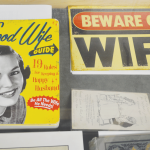If you think feminism is overrated and sexism doesn’t exist, you need to go visit the Ferris Museum of Sexist Objects.
The museum, which had an open house preview at the end of March, is full of hundreds of tangible examples of the oppression women have been facing for a long time and continue to face today.
“I think people of this generation coming up think it’s a problem of the past, but most of the things in this room have been purchased in the past 5-10 years,” Tracy Busch, assistant professor of history and the faculty lead for the museum said.
Some of the objects in the museum are clearly misogynistic and objectifying, but others might require a little more thought on why they made the cut.
“There are still a lot of sexist images and ideas out there, and we’re perpetuating them and we think that we’re in a post-feminist, post-sexist society, but in reality, it’s still there,” Busch said.
For example, the Easy-Bake Oven is on display. Most of us girls probably had this childhood toy growing up and didn’t think twice about the problem with baking tiny cakes in a mini purple oven.
“There’s not necessarily anything sexist about it, but it goes along with gender norming,” Busch said. “If you’re giving that to your daughters and not letting your son play with it, you’re giving your daughters a consistent message that that’s where her value lies; in doing housework.”
However, some of the items in the museum, such as a calendar featuring nude women, aren’t objects and ideas strictly pertaining to women. We can easily find pictures and items featuring naked men in many places and stores, so why are more issues raised when women are the ones being objectified?
“I think that while it does go the other way and we do have bad stereotypes of men, it’s really the oppression of women because we don’t have the power in the country,” psychology senior Brittany Wellman said. “Straight, white, middle-aged males have the privilege in the country.”
Psychology senior Tyler Felty also agreed that history is a huge factor in why objectification of women is seen as such a problem.
“It’s not up to a male-dominated patriarchy to decide that women shouldn’t have the right to have these same statuses when you’re in a culture that portrays such misogynistic tendencies,” Felty said. “We’re talking about the systematic objectification of women throughout thousands of centuries of time.”
According to Professor Busch, the purpose of the museum is to show people that sexism is still an issue women deal with and to help them understand how it affects our lives.
“Ultimately, it’s awareness that can lead to activism,” Busch said. “Sometimes you need a place like this to put all the pieces of the puzzle together.”
If you do go to the museum and are inspired to take action, Wellman said there are a lot of opportunities to encourage change, even here on campus.
“There’s a lot of stuff you can do, like promoting the museum so more people know about it,” Wellman said. “And obviously, stop making stupid sexist comments and stop participating in a lot of the stuff we see in there. I think part of it is just realizing what the problem is and not dismissing women and dismissing the idea that we have equality.”
The Museum of Sexist Objects is located in Starr 314. According to Professor Busch, the museum is open for limited hours until it opens permanently in fall 2015.

